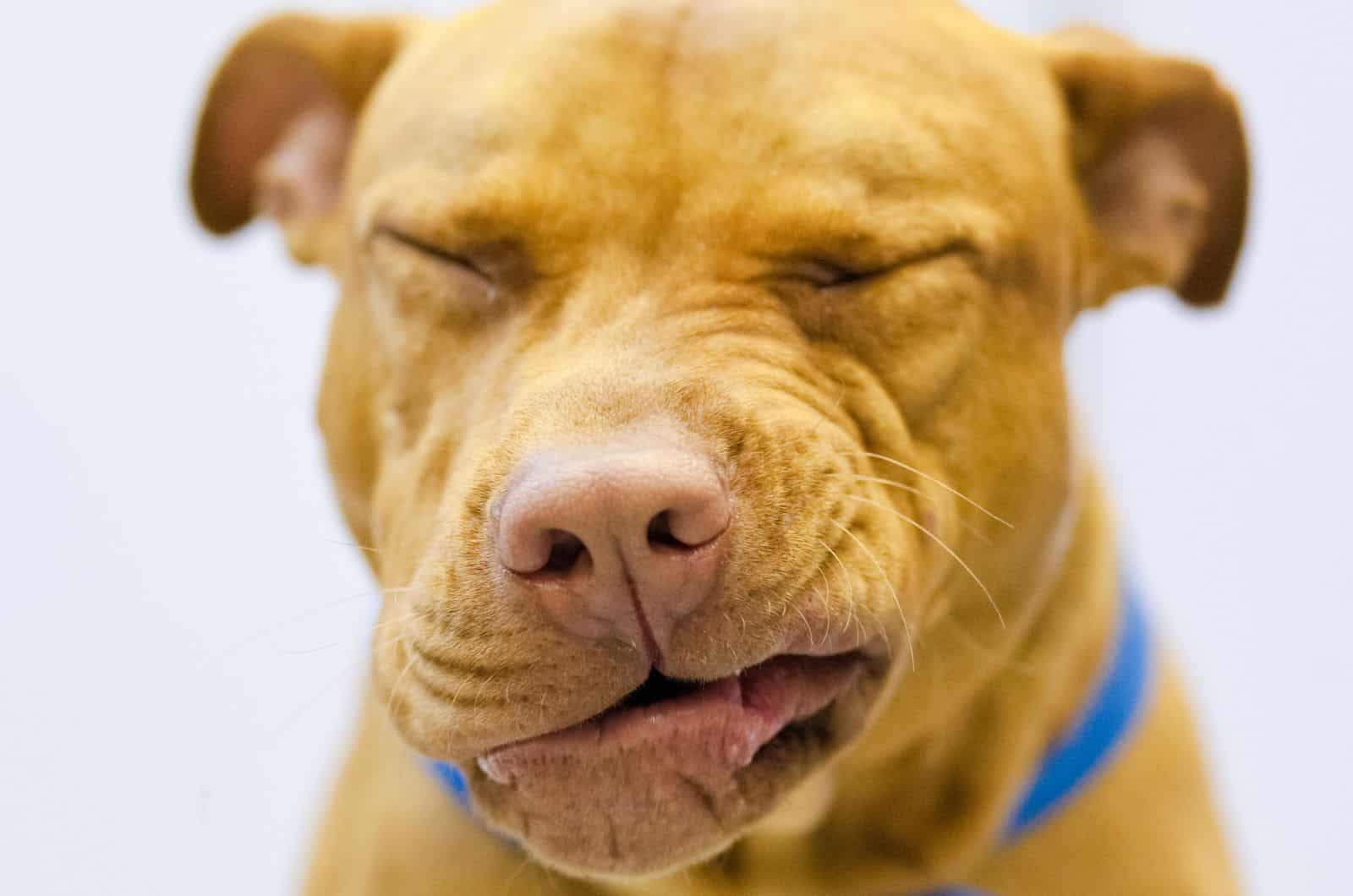When you are a dog owner, you want to be sure your doggo is alright! So, when they sneeze a bit too often, we immediately start wondering what the problem is and how we can fix it.
Of course, in most cases, sneezing is not a big problem. It passes on its own and the dog continues its normal life. And we continue our normal life, too.
But if the sneezing persists or it seems to be a reoccurring thing — we start thinking about the possible solutions to the problem.
Should we take the dog immediately to the vet? Or should we work something up on our own?
If the sneezing is persistent and we can see it is interfering with everyday life, then it is time to take your dog to the vet. But, if you are unable to take the dog to the vet at the moment, you can try these 15 home remedies for sneezing dog.
Home Remedies For Sneezing Dog
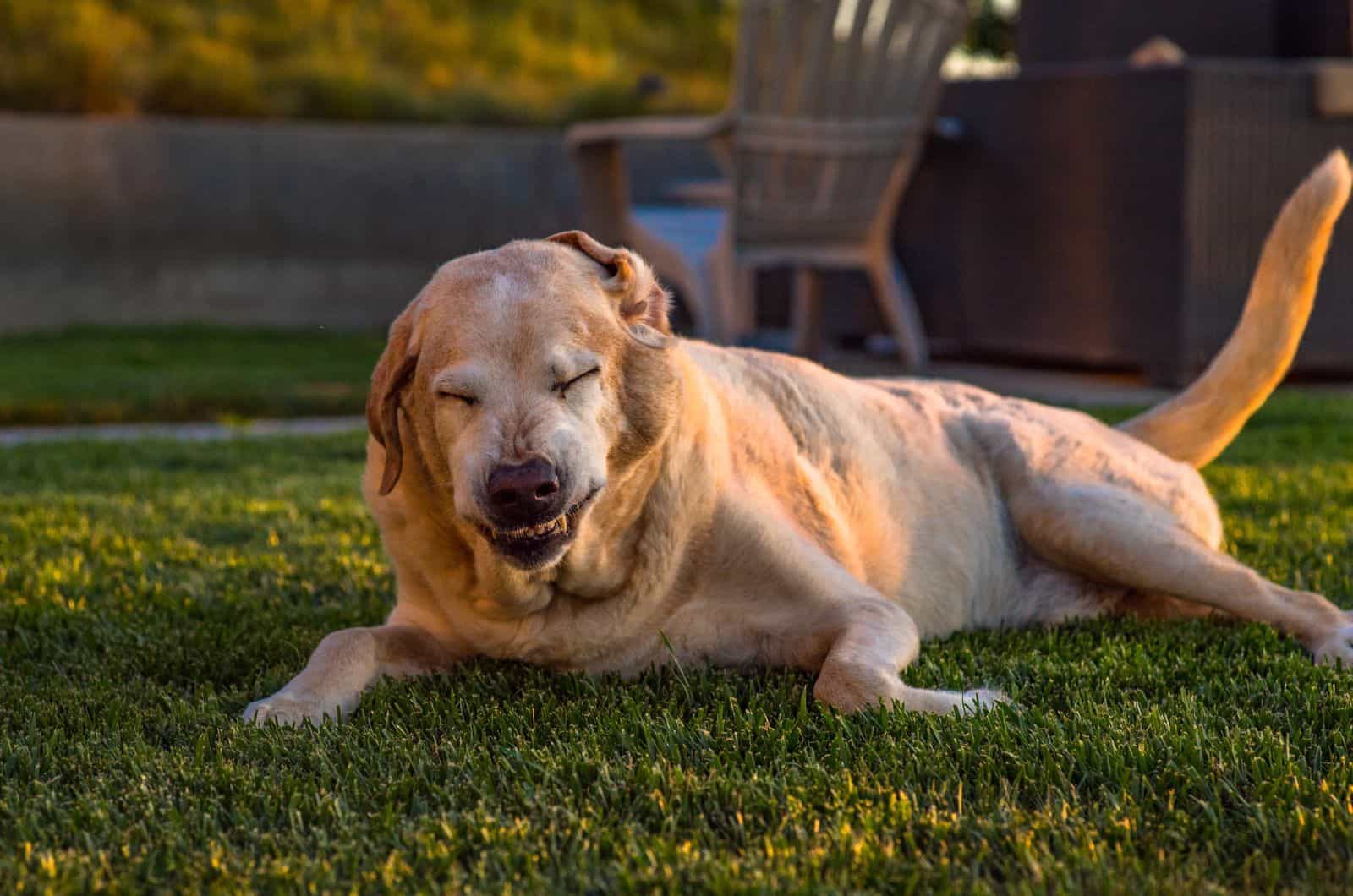
Think of these 15 remedies for a sneezing dog as a first aid kit. They can help, but if the sneezing returns after a few days or a week — take the dog to the vet. The sneezing could be an underlying cause of something much more serious.
Even if it’s not something much more serious, taking your dog to the vet will ease your mind and help solve the problem quicker. The vet can examine the dog and tell us to continue with the home remedies or solve the problem on the spot.
But don’t worry, most of the time it’s just a passing allergy symptom or the dog got something stuck in his nose. Whatever the cause is, you can see how to solve the problem on your own and in your home in the text below.
These are all home remedies that you can easily do or find in your local shop or pharmacy.
1. Humidifier
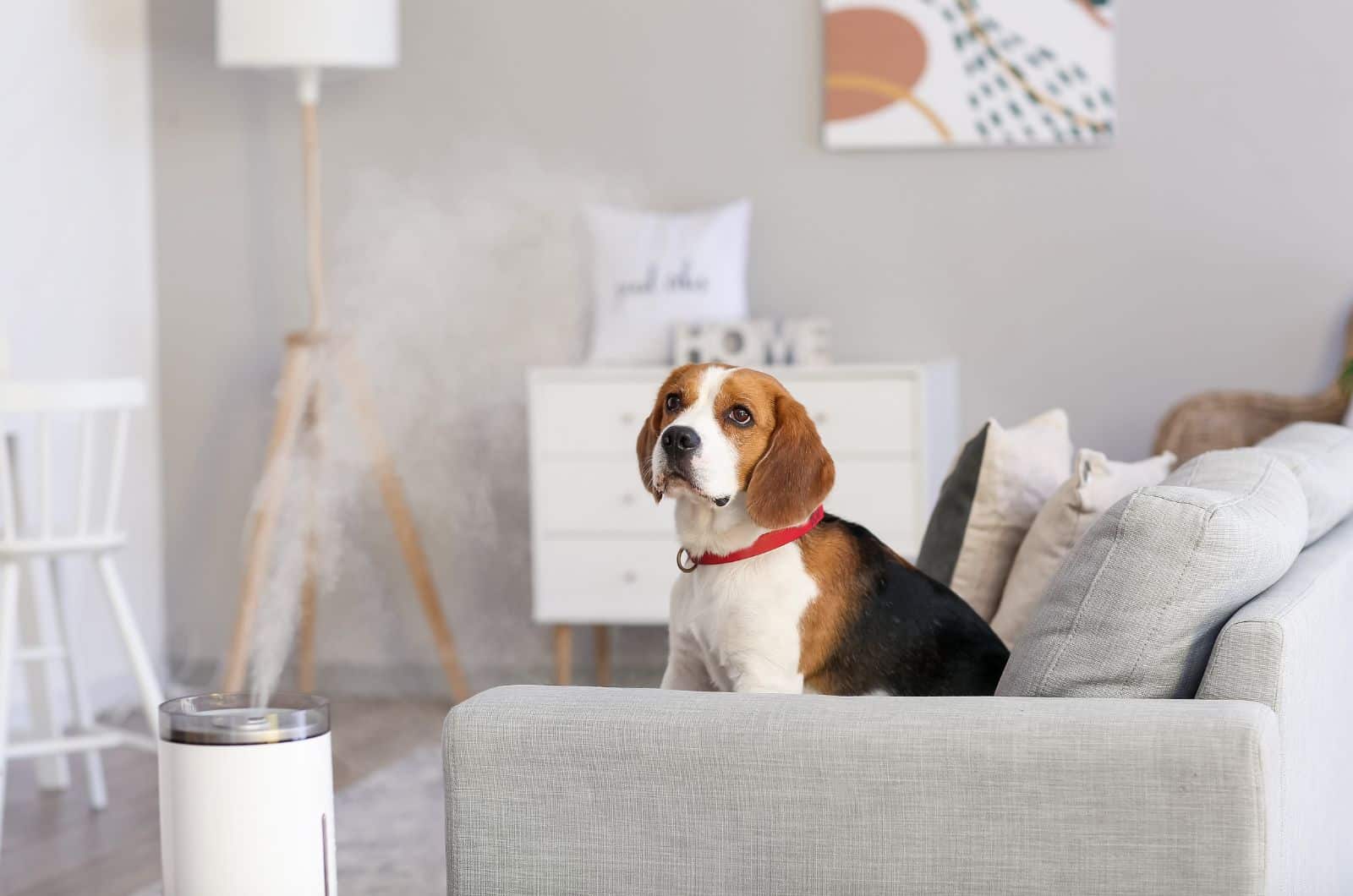
If your dog has problems with a stuffy nose or sinus infections, then a humidifier can solve the problem.
The humidifier releases vapor into the air. The warmth and the steamy air can help your dog with the sneezing problem. How?
The dog with a stuffy and runny nose has some kind of infection. It can be a sinus infection or a throat infection, or a cold symptom. In all of these cases, the nose mucus in your dog’s nose becomes thick. The dry and cold make the mucus too hard to be removed.
The thickened mucus blocks the nostrils, and the dog has only one solution — sneezing.
But it can’t help much. So, we need to step in. You can turn on your humidifier and put it in the room where your dog spends time or sleeps.
The warm and steamy air helps loosen up the mucus and enables the dog to breathe normally again. But if the dog has a stuffy or runny nose, you do still need to take the dog to the vet as soon as possible.
A stuffy nose can be a sign of an allergy, but if your dog also coughs or it is dry heaving, or it has any other more serious symptoms like lethargy, lack of appetite, etc — the best solution is to take the dog to the vet.
Even if the humidifier helps, it only solved the symptom and not the entire problem.
2. Steam
The steam from a hot shower is another one of the great home remedies for a sneezing dog. A hot shower and the steam it produces are a great solution if you don’t have a humidifier.
I am speaking from experience — I’ve tried this, and it has helped my doggo. If you happened to be stuck at home and can’t take the dog to the vet, turn on the shower and let it steam up the room.
Of course, don’t bring the dog too close to the hot water — for obvious scorching reasons. But make a spa day for your doggy and yourself. Sit with your dog in the steaming bathroom and wait for the steam to work on your dog’s nose.
The steam from the hot shower will clear the nostrils and stop the sneezing. But, if it’s a cold or a sinus infection, it is only temporary. Once the mucus hardens again inside the dog’s nose — the sneezing will return. So, it is going to be a sleepless night.
You’ll need to “steam” your dog as often as it needs to be done in order to keep the mucus from hardening. As you can see, this is a true representation of first aid.
It’s like putting a bandage on a wound that needs suturing. You will need to take your dog to the vet if the stuffy nose persists.
3. Essential Oils Therapy
Aromatherapy or essential oils therapy has been used by people to elevate overall well-being for thousands of years.
It has gained popularity in the last two decades, but that doesn’t mean we can use all of the essential oils on dogs too.
Dogs are not the same as humans, so the dosage, type of oil, and the way we use essential oils must be different too. First and foremost, avoid using full-strength essential oils on dogs.
They can be dangerous for dogs, and we can do more harm than good.
Also, if you are going to implement aromatherapy into your doggo’s everyday life, consult the vet first.
We can use essential oils as flea and tick repellants, to soothe skin irritation, and stop the sneezing caused by stuffiness or irritation.
But we should be very careful how we apply the essential oils to dogs. It should never be applied directly on the dog’s skin or any other part of the body — especially not the oral or nasal cavity!
What Is Safe To Use?
Even though most essential oils can be toxic to dogs, there are some safe ones for our pooches to be around.
The safe essential oils you can use as home remedies for sneezing dogs are:
- Chamomile
- Myrrh
- Lavender
All of these essential oils must be used as air dispensers in low concentrations and never directly applied to a dog!
Make sure your dog doesn’t lick the air dispenser or any residue. If your dog does ingest some of the oil residues, they can have an allergic or toxic reaction and start vomiting, usually yellow foam.
4. Herbs
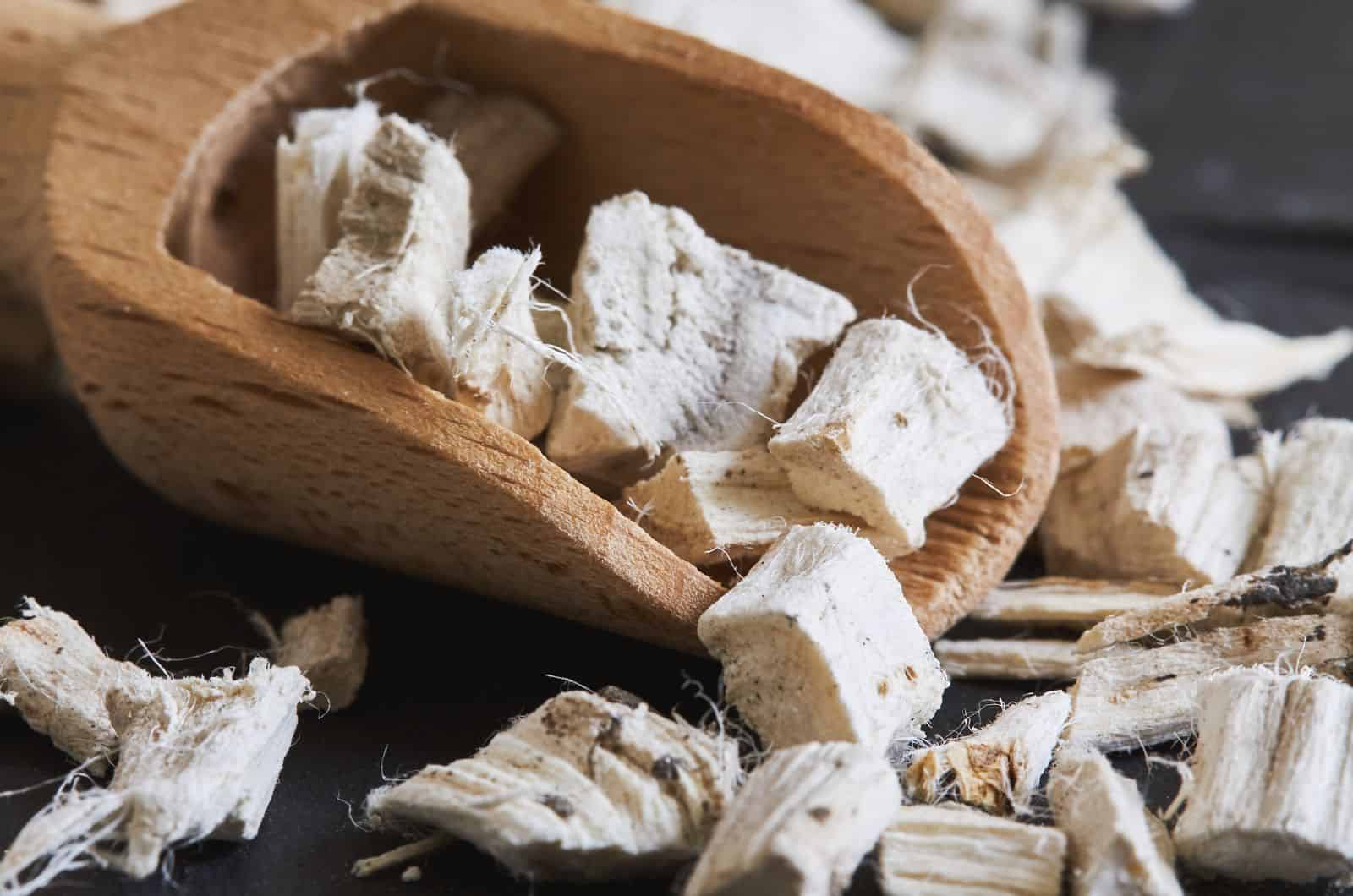
Dog sneezing can be reduced or stopped using natural remedies such as herbs. These home remedies for sneezing dog can be good for the overall health and immune system of your dog.
A dog’s immune system needs supplements from time to time, just like our immune system needs them, too. But, when it comes to dogs and herbs, we should be very careful what we give them to eat.
Most herbs we use every day can be toxic to dogs. But luckily some are not toxic and can be quite helpful. For example, we can give our dogs some basil to eat or chamomile tea to drink.
When it comes to home remedies that can clear the nasal passages or ease the irritation and stop the sneezing, there are some herbs we can use.
- Kali bichromicum
- Mullein
- Marshmallow root
You can also help boost your dog’s immune system by giving them some vegetables (e.g. Brussel sprouts, carrots, etc.), probiotics, omega-3 fatty acids, or cilantro in small amounts.
When it comes to any of the herbs or immune system boosters we mentioned, always consult your vet before adding these supplements to your dog’s diet.
5. Coconut Oil
When it comes to seasonal allergies and the sneezing that goes with them, coconut oil can be one of the best home remedies for sneezing dog.
Coconut oil acts as a home remedy for allergies instead of steroids. You can apply the coconut oil topically or mix it with the dog’s food. Topically means you can apply coconut oil directly onto the skin or, in this case, the nose.
When you look for coconut oil to use for your dog’s sneezing, look for virgin coconut oil. You can use the one we use for cooking, but it is not as effective as virgin coconut oil.
Coconut oil has other benefits too. It can help relieve itchiness and other allergy symptoms and it can be used as flea and tick repellant.
6. Honey
This is a home remedy that can be easily attained. Honey has been proven to be a great immune system booster. Your dog is safe to eat honey, of course, but in small amounts.
But those small amounts are enough to help with the sneezing. Honey has a lot of vitamins and minerals, and it can help with cold symptoms, kennel cough, aching throat, and allergy symptoms too, and it can be a great source of energy for your dog.
When your dog is sneezing because of a stuffy nose, because of a foreign object, or any other reason that makes the dog avoid food — honey can be a great energy source.
Of course, there are ways to help your dog eat food when he’s sick, but sometimes honey can help not only soothe the irritation and reduce sneezing, but it can also give the dog’s body the necessary energy.
7. Aloe
Sometimes, a dog will sneeze when it feels discomfort coming from the dryness of the nose or throat. Sneezing doesn’t have to come from nasal discharge and dog allergies — itchy skin, especially around the nose, can be a cause too.
So, if you notice that your dog has a dry nose, you can find aloe and moisturize your dog’s nose with it. The aloe has a soothing effect and the moister will release the pain and discomfort.
But, before you apply aloe to your dog’s nose or itchy parts of the skin around the nose, make sure to apply a little bit first and wait a couple of minutes to see if there is any reaction.
Aloe is safe to use, but sometimes, just like in humans, it can cause a local allergic reaction. So, it is better to be safe than sorry. Try a little bit first and then, if there is no reaction, apply more on the itchy, flaky, or dry skin or nose.
8. Chicken Soup

Of course, we have to put chicken soup on the list of home remedies for sneezing dog. Everyone knows the benefits of a warm chicken soup when we are feeling under the weather.
It is the same for dogs! A nice bowl of chicken soup can help relieve the symptoms of allergies or colds, and reduce or entirely stop sneezing. You can also help the dog’s health in general by giving it some soup to drink.
Just remember:
- The soup must be lukewarm
- No salt
- No spices
- No chicken bones
- It cannot replace water
See Also: Can Dogs Eat Spicy Food And Is It Safe For Them?
9. Hydration
Drinking enough water is the number one priority when it comes to dogs’ health. Dehydration is a very serious condition that can lower the immune system and endanger the overall well-being of a dog.
When a body is under attack by an allergen or a virus, drinking water is essential to help the immune system fight the problem. So, a fresh bowl of water is a must.
Sometimes, you can notice your dog coughing after drinking water, and it could be so-called reversed sneezing and not coughing. But, if the dog is generally sneezing, this occurrence shouldn’t worry you too much.
Of course, if the reverse sneezing continues together with the “normal” sneezing, taking your dog to the vet is the first option.
10. Antihistamines
If a dog’s body is sensitive to a certain allergen, a chemical called histamine overreacts to that allergen and causes symptoms like:
- sneezing
- watery eyes
- itchiness
- stuffy nose
- runny nose
This is called an allergic reaction and just as it can happen in humans, it can happen in dogs too. When we take the dog to a vet, he or she will give antihistamines to the dog to help him fight the allergic reaction.
The most common antihistamine in veterinary medicine is Benadryl. This is a brand name for the antihistamine veterinarians use to treat allergies in dogs and other pets.
11. Change The Food
This can be one of the simplest home remedies for sneezing dog, but an effective one. If you notice your dog also drools a lot or lacks energy — you can try to completely change the food you are giving to your doggo.
The reason for this is that the food might cause allergies. If you are feeding your dog kibble food, take the bag to your vet and ask what ingredients are the most likely to cause allergy problems. You can also ask your vet to recommend a dog food brand that will be the best option for your dog.
If you have the time, you can switch to homemade dog food, like boiling a chicken or building some beef with veggies, etc. There is a raw food diet as an option on the table, as well. But, before you do change your pet’s diet, as I said, consult the vet first.
Pat Attention To…
If you want to be sure your dog has food problems, pay attention to your dog while it eats and after it finishes the meal. How does it behave?
If it’s a food allergy, it usually takes some time for the symptoms to develop. So, wait up to an hour after your dog has eaten, and look for the allergy signs.
If your dog starts to sneeze, shake its head, or even cough — your dog may be allergic to its food. This is especially true if it happens every time your dog eats.
12. Check The Nasal Cavity
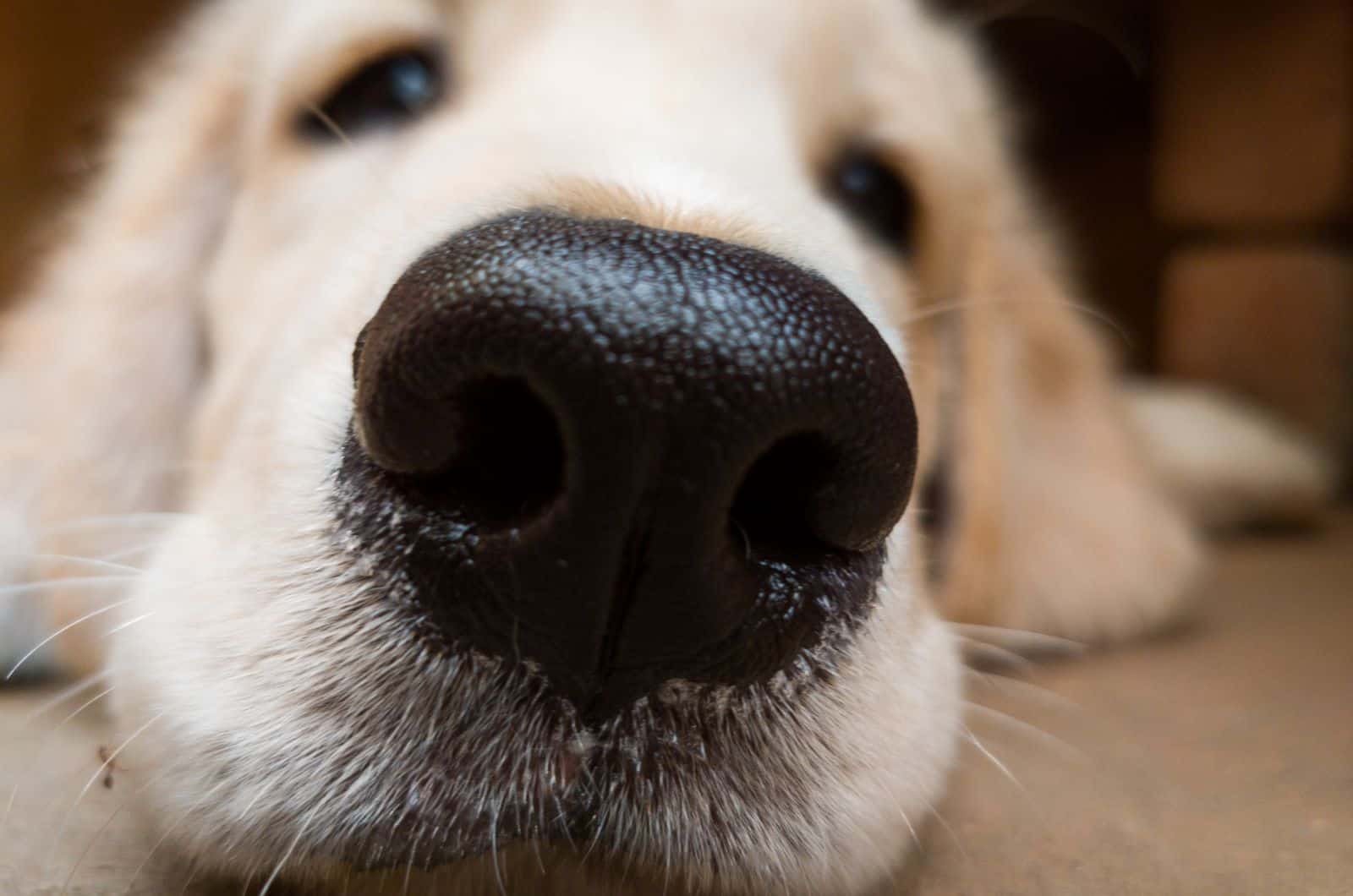
If the sneezing starts suddenly and without any other symptoms, then check the nasal cavity of your dog. It can be tricky, but it can be done. Use a flashlight, hold your dog tight and take a look inside the nostrils.
Sometimes, some foreign objects can get stuck inside your dog’s nose. Your dog might have inhaled something while he was sniffing around, blades of grass or a piece of foxtail might have got stuck inside.
A dog can show other signs besides sneezing, like rubbing its nose with its paw or rubbing the nose on the floor or other objects. This is all in an attempt to remove what’s inside.
If you do find out that there is something stuck inside the nasal cavity of your dog, you can try to remove the object on your own — using tweezers, or you can play it safe and take the dog to the vet.
13. Check The Oral Cavity
Now that you have a flashlight in your hand and your doggo in front of you, you can check the oral cavity too. Dogs can sneeze if they have something stuck in their palate or gums, too. Especially if there is a foreign object in the upper jaw.
So, if you didn’t find anything in the nose, shine a light on your dog’s mouth. Look around to see if there is anything unusual. It doesn’t have to be a foreign object, it can be a dental problem, too.
A broken tooth, aching tooth, or inflamed gingiva (gums) can be an answer to the question, ‘why is my dog sneezing all of a sudden?’ A tumor can also cause sneezing. If you see a growth in your dog’s mouth and it’s not going away on its own — a trip to the vet is your first thing to do.
While You Have A Flashlight
Check the other parts of your dog’s head. If you didn’t find anything in the nasal and oral cavity, take a look around your dog’s head. Maybe it has something stuck inside its ear? Or it might be an ear infection.
If it is an ear infection, you will notice the usual infection signs:
- Redness
- Swelling
- Pain or discomfort
- Discharge
As a pet parent myself, I can tell you that a foxtail plant can be very dangerous for any dog breed. Your dog doesn’t have to have floppy or bushy ears to have problems with this type of grass. So, whether you have a rose-eared doggo or a floppy one, check the ears too. It is easy but it can be one of the very effective types of home remedies for sneezing dogs.
14. Cleaning
Cleaning the place where the dog spends most of its time is essential in these sneezing situations. Sometimes allergies can be caused by dust mites. We might not see them, but there are around us and they are one of the most common allergens in humans, and apparently — they can cause allergies in dogs too.
But you won’t be removing just the dust mites, but germs and other potential causes of the sneezing, too.
So, change your dog’s basket sheets, and blankets, and clean the food bowls, toys, and floor. Whatever comes in contact with your dog, and you think might cause the sneezing — you should clean it.
Of course, you can use shampoo and clean your dog, too. Just, be sure to use the shampoo made for dogs, and not for humans. Your dog will be OK if you use shampoo for us once but using it every time will cause problems.
See Also: Can You Use Head And Shoulders On Dogs?
15. Rest
Finally, when you’ve applied coconut oil, turned on your humidifier, boiled some chicken soup, and cleaned everything up — it is time to rest.
If your dog has an infection or allergic reaction, its body needs to rest and gather strength to fight the problem in its body.
So, it is OK to let your dog sleep even if it’s time for your usual walk to the park. You can take a short walk or play some games inside. Sleeping and rest are essential to body recovery, no matter if it’s an infection or allergies — they are still great home remedies for sneezing dog.
Pay Attention To The Breed
When it comes to exercise and rest periods, you have to pay attention to your dog’s breed. Some dogs need less exercise and more rest.
There are also dog breeds that have a harder time overcoming sneezing issues because of their brachycephalic skull shape which is a cause of brachycephalic airway syndrome. These dog breeds are Pugs, Bulldogs, Shih Tzus, etc.
Give them more time to relax and don’t push them too hard, especially if they are sneezing a lot lately.
What Can Cause The Sneezing?
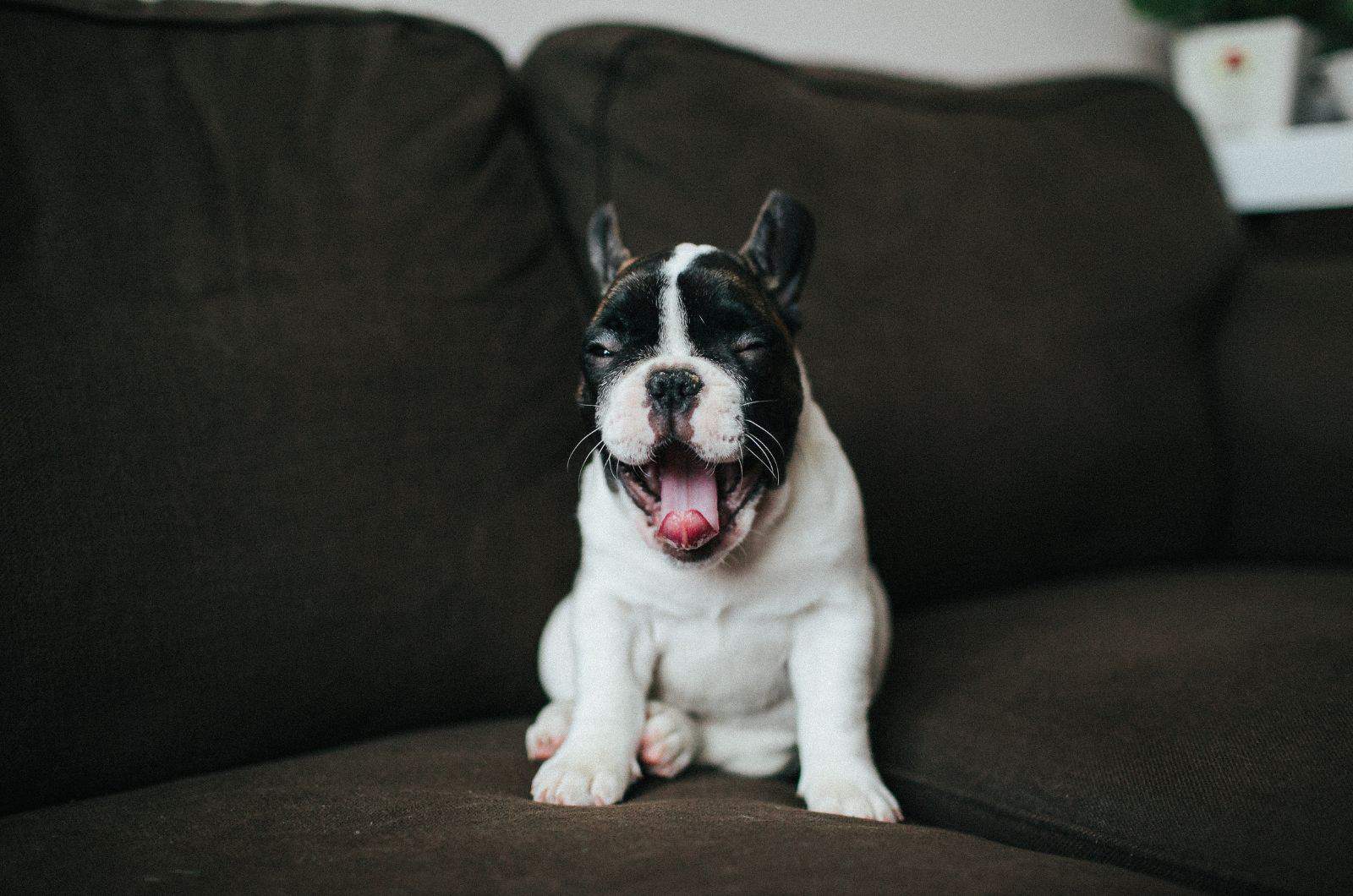
We’ve talked about the home remedies for sneezing dog and how they help our doggos. Throughout the text, we’ve also mentioned some of the most common causes of dogs’ sneezing issues.
But I’m going to give you a whole list of the things that can cause sneezing in dogs:
- Allergies
- Infections
- Foreign Objects
- Dental Problems
- Tumors
- Brachycephalic breed
- Excitement
The only thing we haven’t mentioned is excitement. That’s because it is not a problem but a natural way for dogs to show their excitement. It is their way of communicating with us or with other dogs.
If your dog sneezes when he or she sees you or when you want to give them a new toy — they are OK. As long as you know their nose is not stuffy or they don’t have infection symptoms, let them sneeze.
The Conclusion
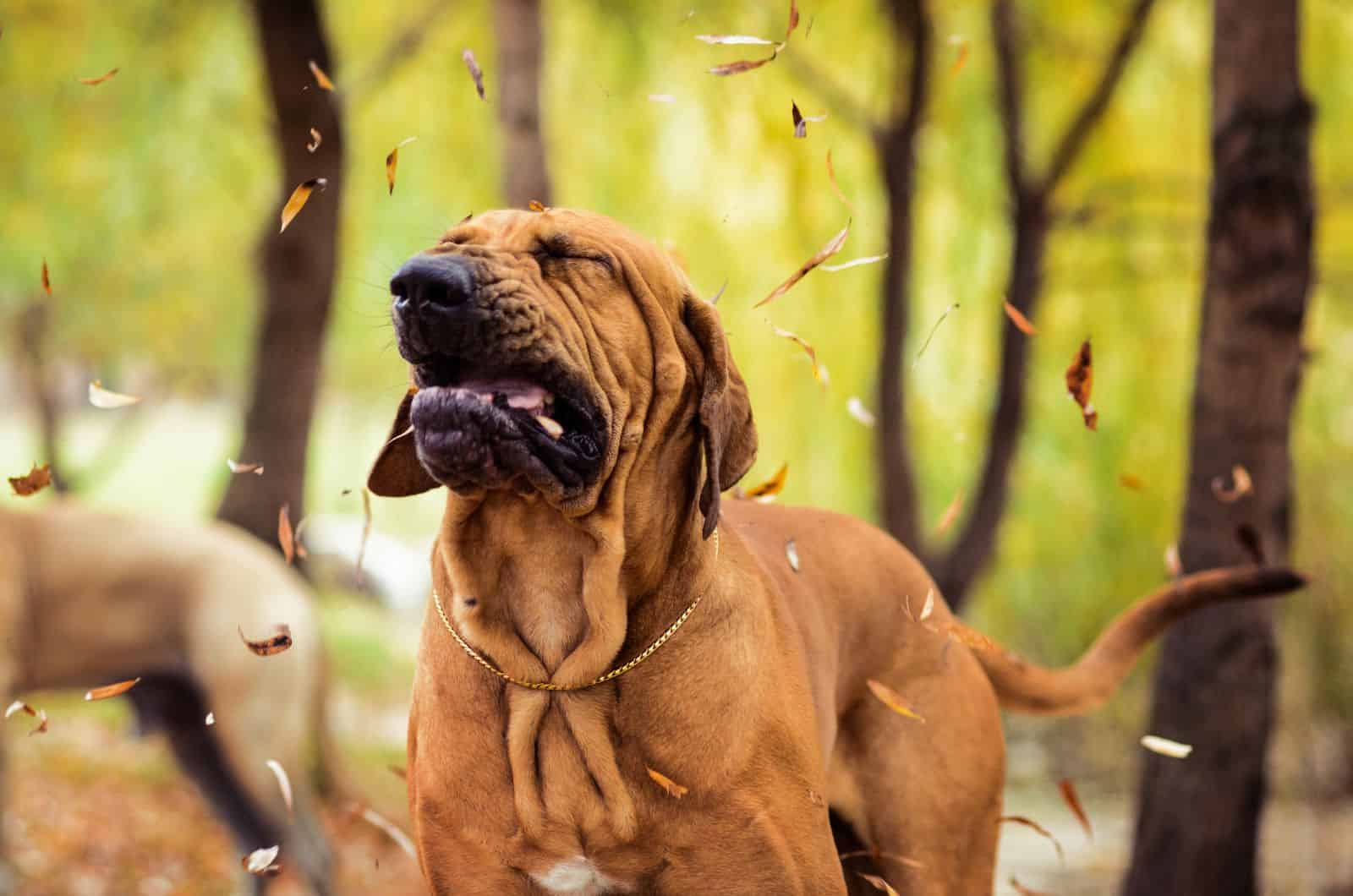
These home remedies for sneezing dog are proven to be effective. Some are quick in solving the problem, others need some time.
Depending on the underlying problem that led to sneezing, these home remedies can be permanent or temporary.
As a pet owner, it is your first responsibility to check for other signs of a possible infection or disease connected to sneezing. It is always better to take your dog to the vet and make sure your doggo is alright.
But sometimes we can’t take the dog to the vet right away, and that’s when these home remedies for sneezing dog come in handy.
Try them out, see what’s best for your dog, and don’t forget to say dog bless you when you hear that Achoo!
Read Next:
• How To Treat A Limping Dog At Home? First Aid Help Guide
